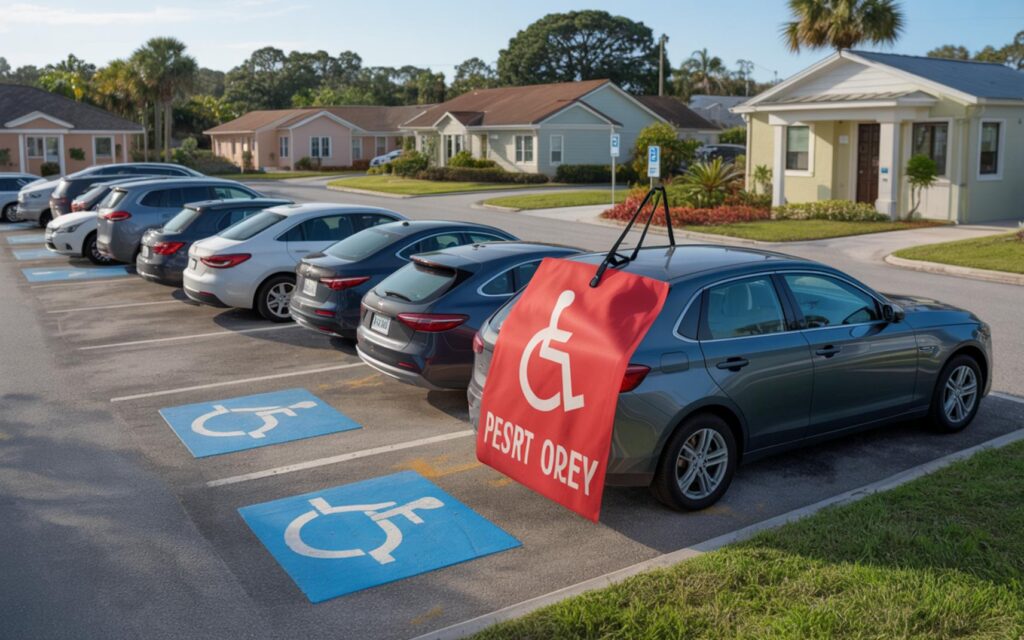Florida disabled parking permits for pregnant women are now available, following a new law effective July 1, 2025. The program allows expectant mothers to apply for a temporary disabled parking permit, addressing physical challenges faced during pregnancy and setting a precedent for inclusive mobility policies.
Florida Disabled Parking Permits for Pregnant Women: Key Details
The Florida Department of Highway Safety and Motor Vehicles (FLHSMV) has begun issuing temporary disabled parking permits to pregnant women. This initiative is designed to improve access and safety for expectant mothers experiencing fatigue, pain, or mobility issues, particularly in Florida’s hot and humid climate.
According to FLHSMV, the permit is valid for up to one year from the date it is issued. Pregnant women must submit a completed application form (HSMV 83040), signed by a licensed Florida physician, and pay a $15 fee. Permits can be obtained at local tax collector offices or license plate agencies throughout the state.
How the Temporary Disabled Parking Permit Works
The temporary disabled parking permit allows pregnant women to park in designated disabled parking spaces across Florida. This provides closer access to buildings and reduces the need for long walks in high temperatures or while carrying additional items related to pregnancy.
FLHSMV reports that application forms are available online and at local agencies. County tax offices and the state DMV are actively promoting the program to ensure eligible individuals are informed about the new option.
Eligibility and Application Process
- Eligibility: Any pregnant woman residing in Florida may apply.
- Required Documentation: Signed form from a licensed Florida physician confirming pregnancy.
- Fee: $15 per permit.
- Where to Apply: Local tax collector offices or license plate agencies.
- Duration: Permit valid for up to one year from date of issuance.
Background and Policy Context
The new policy was introduced to address the specific mobility challenges pregnant women face. According to state officials, the law recognizes that pregnancy can significantly limit mobility, especially in later stages or during periods of extreme heat common in Florida.
Florida’s approach is broader than similar programs in other states. For example, Illinois restricts eligibility to women in the third trimester, while Florida’s law covers the entire pregnancy and up to a year postpartum. This expanded access is intended to offer more comprehensive support for expectant mothers.
Comparison With Other States
- Florida: Permit available throughout pregnancy and up to one year postpartum.
- Illinois: Permit generally restricted to the third trimester.
- Other States: Most do not offer temporary disabled parking permits specifically for pregnancy.
Expert Perspectives on Mobility and Access
Health and mobility experts across Florida recognize pregnancy as a temporary condition that can cause significant mobility limitations. These challenges are often heightened by Florida’s climate, with high temperatures and humidity increasing the risk of fatigue and heat-related health issues.
Experts generally support measures that improve parking access for pregnant women, noting that such policies can reduce health risks associated with long walks or carrying heavy items. There is broad agreement that the new permit program sets a precedent for accommodating a wider range of temporary mobility challenges in public spaces.
Concerns About Parking Availability
Some experts and advocacy groups have raised concerns about balancing the needs of pregnant women with those of individuals with permanent disabilities. According to these groups, careful monitoring of permit issuance and parking space availability will be important to ensure that the needs of all eligible users are met.
Public Response and Ongoing Developments
Public reaction to the new disabled parking permit for pregnant women has been mixed. Some Florida residents support the expanded support for expectant mothers, while others express concern about potential overcrowding in disabled parking spaces.
The program is being closely watched by other states considering similar measures. According to FLHSMV, the implementation process is ongoing, and officials may update procedures based on feedback and monitoring of parking space availability.
Statewide Promotion and Information Access
- County tax offices and the state DMV are promoting the program through official channels.
- Application forms (HSMV 83040) are accessible online and at local agencies.
- Information about eligibility and the application process is available on the FLHSMV website.
Frequently Asked Questions About Florida Disabled Parking Permits for Pregnant Women
What is the new Florida disabled parking permit for pregnant women?
The new permit is a temporary disabled parking pass available to pregnant women in Florida. It allows parking in designated disabled spaces for up to one year from the date of issuance.
How much does it cost to get a temporary disabled parking permit during pregnancy?
The fee for the temporary disabled parking permit for pregnant women in Florida is $15. This fee is paid at the time of application at a local tax collector office or license plate agency.
Are there special requirements to apply for a pregnancy-related disabled parking permit?
Applicants must submit a completed form signed by a licensed Florida physician confirming pregnancy. The form and fee must be submitted to a local tax collector office or license plate agency.
Can you use the disabled parking permit after pregnancy?
The permit is valid for up to one year from the date it is issued. This may include the postpartum period, depending on the date of issuance and the individual’s needs.
Where are Florida disabled parking permits for pregnant women issued?
Permits are issued by the Florida Department of Highway Safety and Motor Vehicles. Applications can be submitted at local tax collector offices or license plate agencies throughout the state.
































